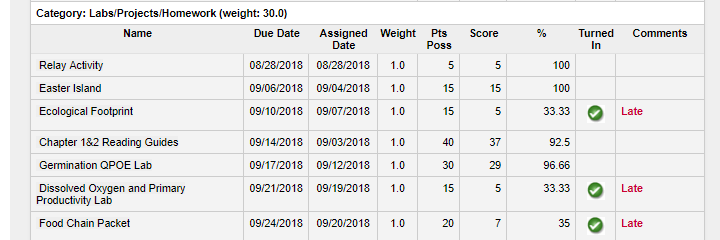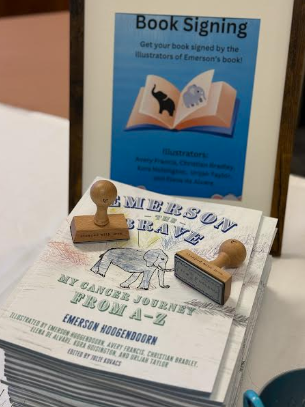“OK, there’s about 15 minutes left and I know you guys are busy. Go ahead and use the rest of the time to complete your packets on the Supreme Court cases.” This message is a gift to any busy student. Yet in one corner of the class, a group of three immediately begins a discussion on what shows they have been watching on Netflix. Near the front, two people scroll through Instagram on their phones while another individual plays a game on his Chromebook.
Anyone in the West Ottawa community will say the students defy expectations. Posters line hallways with impressive statistics, and administrators advertise statewide rankings with WO at the top. The students are impressive, especially considering the wide variety of ethnic and economic backgrounds.
Despite the success at WO, students’ work ethic needs to improve. The focus for most students is “good enough” rather than “I can make this better.” If there is a way to achieve the grade with less work, many students take that path, even if it means less learning. A survey of West Ottawa students asked, “If you could automatically earn an A in a class, but were not allowed to come to school and learn to earn the grade, would you take the automatic A?” Out of 84 responses, 62 percent said yes, they would take the automatic A. For many, learning is not the top focus.
Truly, many West Ottawa students work exceptionally hard. Some students push themselves to take difficult classes, over a dozen become valedictorians every year, and several student-athletes find success in the classroom and on the playing field.
However, when compared to many schools around the nation, even the world, West Ottawa students need to work harder. This is a global economy, and West Michigan is not the only competition.
Take Northview High School in John’s Creek, Georgia: students have an incredibly different mindset than most at WO. In their advanced classes, academics is the only priority. “It’s not enough that we have an A; there is a large distinction between a 90 and a 99 or a 98.4 vs. a 98.5,” Northview student Cherie Song said.
Extra credit is almost always exploited. Student Andrew Wang gave the example of writing an extra credit essay in AP English Language. In his classes, every student takes advantage of any extra credit offered.
The same is not true at West Ottawa. Instructor Ken Strobel offered an extra credit opportunity to his AP English Language students toward the end of last semester. Only 4 of the 57 students submitted that work.
According to several Northview students, work ethic is enforced strongly by parents, many of whom are Asian immigrants. Parents are determined to ensure their children will have a better life than they did. While a majority of the student population is Asian, student Joanna Chen said all students have this mentality: “I can not speak from experience, only observation. And I have observed that the pressure to study and do well in school still applies, a pressure that seemingly stems from their Asian peers.”
Outside of the United States, the difference in work ethic also exists. Tunisian exchange student Ines Baccari has noticed a clear difference in academics between the West Ottawa and her home school. In Tunisia, students go to school six days a week, and the average school day does not end until five o’clock. “I think school [at West Ottawa] is so much easier. Students are lucky because they have more time for extra activities,” Bacarri said.
Students in Tunisia are motivated by their hopes of being accepted into a top university. “Students want to enroll in medical or engineering school, get scholarships for France and Germany, and in some cases attend Ivy Leagues in the US,” Baccari said.
Moldovan exchange student Valeria Ciolac has a similar experience to Baccari. According to Ciolac, students in Moldova typically spend seven hours a night doing homework, a concept unfathomable to West Ottawa students. “American curriculum is too easy. It does not allow students to use all of their potential,” Ciolac said. “In Moldova, we had to take 14 classes, including three foreign languages.”
Other AP and IB teachers have noticed the decline in work ethic as well. Instructor Shanna Meyer had to administer a retake in her AP Calculus BC class for the first time in five years. “The students had the skills and abilities to do well on the assessment, but the lack of practice, as evidenced by the low homework scores, resulted in dwindling test scores,” Meyer said. Meyer needed to reteach the unit because so many students did not put work into the material the first time.
Getting students to turn in a simple homework assignment has become a struggle. In Strobel’s AP English Language classes, only 59 percent of students turned in a recent assignment on time.
Instructor Dan Dennis experienced the same problem in his IB class last year when he assigned an essay draft due on Halloween with the final draft due in March. Of his ten IB students, only three submitted a draft at any time prior to the final March deadline.
At Northview, this would not be acceptable. When Instructor Elizabeth Lake gave a written homework assignment last month to her 90 AP students, only two did not complete the work. “If I give them an article or something small to read, they unquestionably do it and will shame each other for not doing it if someone doesn’t,” Lake said.
In fact, even when Lake assigns homework that will not be graded, students still complete the work. Throughout the year, Lake assigns challenge writing assignments that do not receive credit and are purely to share and receive feedback. In her 11 years of teaching, she has never had a student not complete the challenge assignment.
While West Ottawa has some students with quality motivation and dedication, many have room for improvement. “Good enough” may earn a passing grade now, but it will not lead to success in the future. When it comes to admission to universities, applying for prestigious jobs, and earning promotions, West Ottawa students will need to compete on a global scale. In order to succeed, students must be prepared to match the work ethic of their highly motivated peers.







